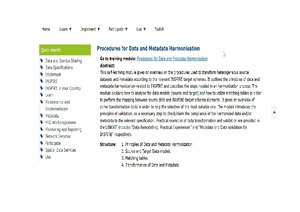| dc.contributor.author | Martirano, Giacomo | |
| dc.contributor.author | Vinci, Fabio | |
| dc.contributor.author | Morrone, Stefania | |
| dc.date.accessioned | 2020-03-09T21:45:34Z | |
| dc.date.available | 2020-03-09T21:45:34Z | |
| dc.date.issued | 2018 | |
| dc.identifier.citation | Martirano, G.; Vinci, F. and Morrone, S.(2018) Procedures for Data and Metadata Harmonisation: INSPIRE online training course. European Union, INSPIRE. Available: https://inspire.ec.europa.eu/training/procedures-data-and-metadata-harmonisation. | en_US |
| dc.identifier.uri | http://hdl.handle.net/11329/1229 | |
| dc.identifier.uri | http://dx.doi.org/10.25607/OBP-744 | |
| dc.description.abstract | Procedures for Data and Metadata Harmonisation
Abstract:
This self-learning module gives an overview on the procedures used to transform heterogeneous source datasets and metadata according to the relevant INSPIRE target schemas. It outlines the principles of data and metadata harmonization related to INSPIRE and describes the steps needed in an harmonization process. The module explains how to analyse the data models (source and target) and how to utilize matching tables in order to perform the mapping between source data and INSPIRE target schema elements. It gives an overview of some transformation tools in order to help the selection of the most suitable one. The module introduces the principles of validation, as a necessary step to check/claim the compliance of the harmonized data and/or metadata to the relevant specification. Practical examples of data transformation and validation are provided in the LINKVIT modules “Data Remodelling: Practical Experiences” and “Metadata and Data Validation for INSPIRE” respectively.
Structure:
Principles of Data and Metadata Harmonization
Source and Target Data models
Matching tables
Transformation of Data and Metadata
Principles of validation of transformed data and metadata
Learning outcomes:
After the module, the participant will be able to identify and describe the steps needed to perform a data/metadata harmonisation, identify the applicable regulations/guidelines needed in an harmonisation and/or validation process, identify the suitable transformation tool(s), evaluate the complexity of a data/metadata harmonisation process.
Intended Audience:
GIS and ICT professionals, who aim to understand the principles of an INSPIRE harmonisation. Non-technical staff belonging to organisations aiming to implement INSPIRE.
Pre-requisites:
Basic knowledge of the INSPIRE directive.
Training format:
PDF documents, presentations, Weblecture. The module is a self-learning module.
Expected Workload:
2 hours
Language:
EN | en_US |
| dc.description.sponsorship | European Commission | en_US |
| dc.language.iso | en | en_US |
| dc.publisher | European Commission, INSPIRE | |
| dc.rights | Attribution-ShareAlike 4.0 International | * |
| dc.rights.uri | http://creativecommons.org/licenses/by-sa/4.0/ | * |
| dc.subject.other | Training course | en_US |
| dc.subject.other | Metadata harmonization | en_US |
| dc.title | Procedures for Data and Metadata Harmonisation: INSPIRE online training course. | en_US |
| dc.type | Web Based Content | en_US |
| dc.subject.parameterDiscipline | Parameter Discipline::Cross-discipline | en_US |
| dc.subject.dmProcesses | Data Management Practices::Data archival/stewardship/curation | en_US |
| dc.subject.dmProcesses | Data Management Practices::Data interoperability development | en_US |
| dc.subject.dmProcesses | Data Management Practices::Metadata management | en_US |
| dc.description.sdg | 14 | en_US |
| dc.description.maturitylevel | TRL 9 Actual system "mission proven" through successful mission operations (ground or space) | en_US |
| dc.description.bptype | Training and Educational Material | en_US |
| obps.resourceurl.publisher | https://inspire.ec.europa.eu/training/procedures-data-and-metadata-harmonisation | en_US |
 Repository of community practices in Ocean Research, Applications and Data/Information Management
Repository of community practices in Ocean Research, Applications and Data/Information Management

